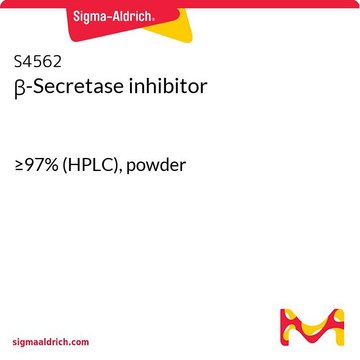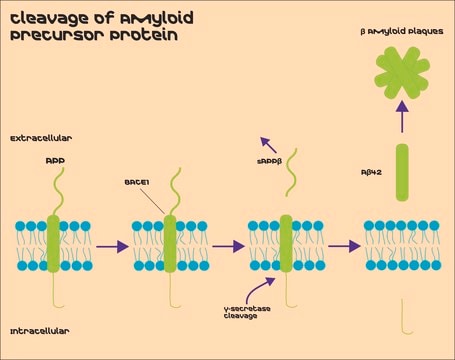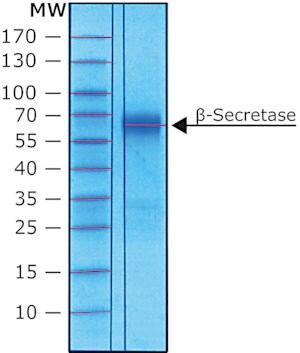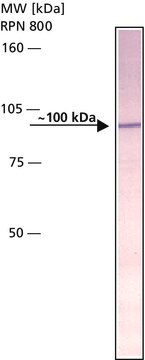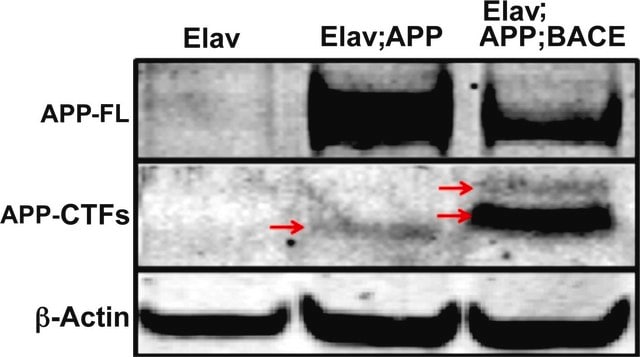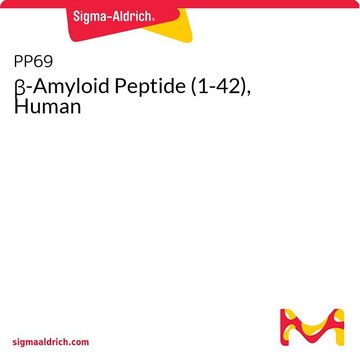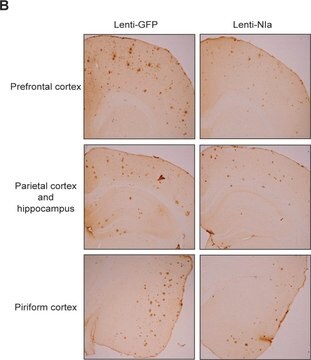S4316
Amyloid Precursor Protein β, Secreted human
recombinant, expressed in E. coli (N-terminal histidine tagged), solution
Sinonimo/i:
Amyloid Precursor Protein β, Secreted, sAPPβ
Autenticatiper visualizzare i prezzi riservati alla tua organizzazione & contrattuali
About This Item
Prodotti consigliati
Descrizione generale
Amyloid-β (Aβ) peptides are a major component of the senile plaques characteristic of the Alzheimer brain. It is a type- I transmembrane protein. The gene encoding amyloid-β is localized on human chromosome 21.
Applicazioni
Human amyloid precursor protein β has been used as peptide standard.
Azioni biochim/fisiol
The secreted amyloid precursor β (sAPPβ) is a proteolytic cleavage product of β amyloid precursor protein (APP). APP is cleaved by β-secretase into two fragments, sAPPβ and β-amyloid peptide (Aβ). The Aβ is a component of amyloid plaques, one of the major hallmarks of Alzheimer`s disease (AD), while the sAPPβ is thought to modulate neuronal function and cell survival. Mutation in APP found in Swedish familial AD pedigree increases the susceptibility of APP to β-secretase cleavage and the formation of Aβ and sAPPβ. In contrast, activation of protein kinase C (PKC) decreases the levels of sAPPβ. The trans-Golgi network (TGN) is the major site for β-secretase activity.
Stato fisico
0.2 μm filtered solution in 20 mM Tris (pH 7.4), 0.5 M NaCl, 1 mM EDTA, 5 mM βME, 2 μg/ml aprotinin
Nota sulla preparazione
sAPPβ was expressed in E. coli as a soluble protein and purified under non-denaturing conditions
Codice della classe di stoccaggio
10 - Combustible liquids
Classe di pericolosità dell'acqua (WGK)
WGK 1
Punto d’infiammabilità (°F)
Not applicable
Punto d’infiammabilità (°C)
Not applicable
Dispositivi di protezione individuale
Eyeshields, Gloves, multi-purpose combination respirator cartridge (US)
Scegli una delle versioni più recenti:
Possiedi già questo prodotto?
I documenti relativi ai prodotti acquistati recentemente sono disponibili nell’Archivio dei documenti.
D J Selkoe
Nature, 399(6738 Suppl), A23-A31 (1999-07-07)
Studies of the molecular basis of Alzheimer's disease exemplify the increasingly blurred distinction between basic and applied biomedical research. The four genes so far implicated in familial Alzheimer's disease have each been shown to elevate brain levels of the self-aggregating
The Processing of Amyloid Precursor Protein in the
Central Nervous System of Humans and Rhesus
Macaques
Central Nervous System of Humans and Rhesus
Macaques
Justyna Anna Dobrowolska
The West Virginia Medical Journal (2013)
Monomeric Amyloid Beta Peptide in Hexafluoroisopropanol Detected by Small Angle Neutron Scattering.
Zhang-Haagen B
PLoS ONE (2016)
C Haass et al.
Nature, 357(6378), 500-503 (1992-06-11)
Progressive cerebral deposition of the amyloid beta-peptide is an early and invariant feature of Alzheimer's disease. The beta-peptide is released by proteolytic cleavages from the beta-amyloid precursor protein (beta APP), a membrane-spanning glycoprotein expressed in most mammalian cells. Normal secretion
D M Skovronsky et al.
The Journal of biological chemistry, 275(4), 2568-2575 (2000-01-25)
The release of amyloidogenic amyloid-beta peptide (Abeta) from amyloid-beta precursor protein (APP) requires cleavage by beta- and gamma-secretases. In contrast, alpha-secretase cleaves APP within the Abeta sequence and precludes amyloidogenesis. Regulated and unregulated alpha-secretase activities have been reported, and the
Articoli
Alzheimer's disease (AD) is the most common cause of dementia in the elderly and is characterized by gradual loss of cognitive functions.
Il team dei nostri ricercatori vanta grande esperienza in tutte le aree della ricerca quali Life Science, scienza dei materiali, sintesi chimica, cromatografia, discipline analitiche, ecc..
Contatta l'Assistenza Tecnica.
